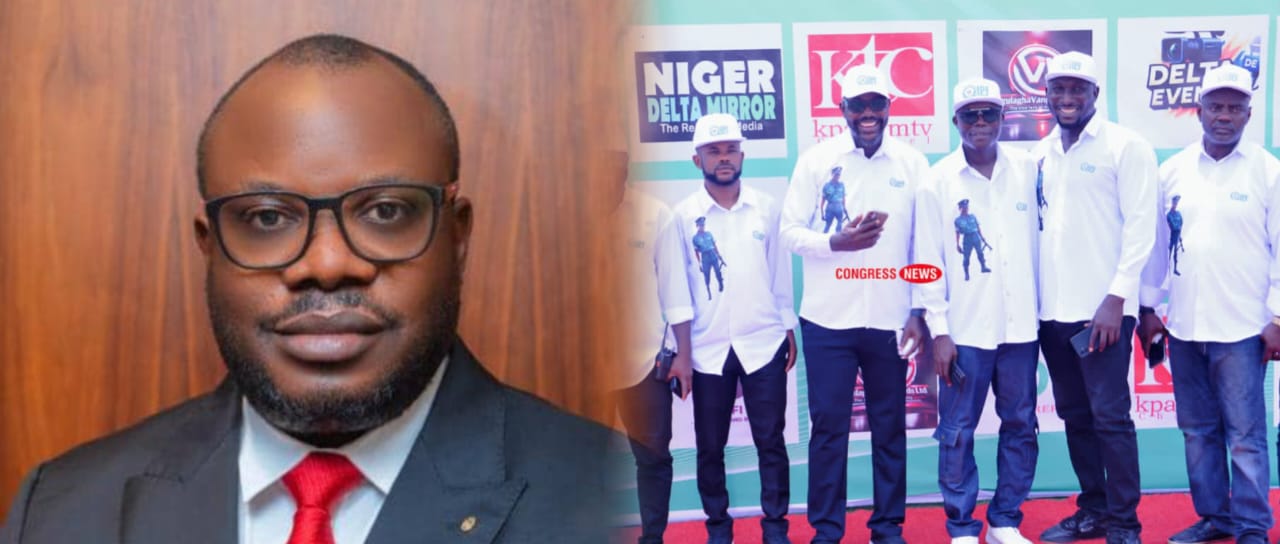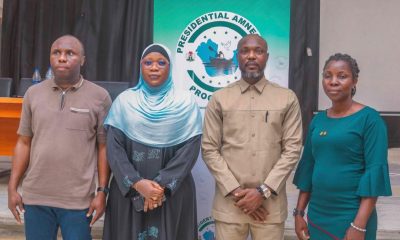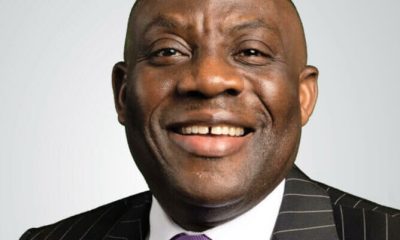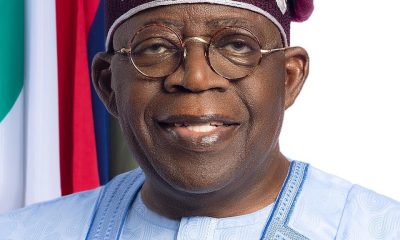News
OPINION: The 18-year-old Age Limit for School Certificate

OPINION: The 18-year-old Age Limit for School Certificate
By Farooq A. Kperogi
The directive by the Education Minister Professor Tahir Mamman to the West African Examinations Council (WAEC) and the National Examinations Council to not register candidates who are below 18 for next year’s school certificate examinations is generating knee-jerk resistance from people who are obviously nescient of the psychology and philosophy behind age benchmarks in education.
In most countries of the world, children don’t start primary school until they are 6, and young adults don’t start university until they are 18. That used to be true in Nigeria, too—until parents chose to skirt the law, upend time-tested tradition, and commit mass child abuse in the name of fast-tracking the education their children.
In fact, contrary to what the Nigerian news media has been reporting, Professor Mamman has not created a new law; he is only implementing the existing law. He hasn’t “banned” under-18 students from taking school certificate exams; he has merely chosen to enforce an extant law, which has been serially violated by overeager parents who want their children to get ahead by any means.
The 1982 education policy, also called the 6:3:3:4 system, requires that children should be at least 5 years old to start pre-primary school and at least 6 years old to start primary school. If a 6-year-old spends 6 years in primary school, 3 years in junior secondary school, and another 3 years in secondary school, they would be 18 by the time they graduate from secondary school.
This is the global standard. In the United States, students apply to enter universities between the ages of 18 and 19 (because if you don’t turn 6 in September of the year you want to start First Grade, you have to wait until next year). In Finland, Canada, the Netherlands, Japan, South Africa, Germany, the United Kingdom, France, Denmark, etc. it is 18.
The age benchmark isn’t arbitrary. It is based on time-honored insights from developmental psychology and educational research, which examined the cognitive, social, and emotional developments of children.
For example, Jean Piaget’s stages of cognitive development tell us that around age 6, children transition from what is called the preoperational stage to the concrete operational stage, at which point they begin to develop logical thinking, which is essential for learning the structured curriculum of primary school education, such as reading, writing, and mathematics.
Research also shows that children develop the social skills needed to interact with peers and teachers in a school environment and the attention span necessary to learn, absorb information, and stay engaged at 6, and that children who start school too early struggle with these skills, which can lead to long-term challenges in academic and social areas.
*That was why the late Professor Aliu Babatunde Fafunwa was famous for saying any education of children before the age of 5 is a waste of time and even child abuse.* From ages 1 through 5, children should be allowed to be children: sleep, play, laugh, and grow. Of course, I recognize that because most mothers now work, enrolling children in schools earlier than is ideal is a necessity. But the busy schedule of parents is no excuse to buck science, ignore the requirements of a well-integrated childhood, and contribute to the mass production of maladjusted adults.
Similarly, research in developmental psychology shows that by age 18, most teenagers have reached a level of emotional and social maturity that enables them to live independently, make decisions, and handle the challenges of university life.
Neuroscientific research also shows that the brain continues to develop well into the early twenties, particularly the prefrontal cortex, which is responsible for decision-making, impulse control, and planning. By age 18, the brain has typically matured enough to handle the complex cognitive demands of higher education.
Plus, in many countries, including in Nigeria, 18 is the age of legal adulthood, which aligns with the transition to university. This legal framework supports the idea that students are ready to take on the responsibilities associated with higher education, such as managing their own time, finances, and education.
Of course, as with everything, there are always exceptions. Precocious children can and do skip grades and start university earlier than 18 even in the United States and elsewhere. There are exceptionally gifted children who graduate from university as early as 11. But such students undergo rigorous tests to determine that they have intelligence that is far ahead of normal developmental schedules. They are also few and far between.
That’s not the situation in Nigeria. Just like our bad national habit of always wanting to jump the queue—what Americans call cut in line—Nigerian parents have, over the years, developed impatience for the normal development schedules of their children and want them to get ahead against the evidence of science, common sense, and even the law of the land.
It is not because their children are exceptional. In fact, they are often mediocre. *For example, my brother’s son, who is only 14 years old and with average intelligence, registered to take his WAEC exam this year. I told my brother that was inexcusable child abuse.*
Nigeria has a bad reputation across the world for sending underage children not just to domestic universities but also to foreign universities. People who work at the International Student and Scholar Services at the university where I am a professor have asked me multiple times why only Nigeria sends underage students here.
The consensus is that such students often lack maturity, have difficulty engaging in adult conversations, and struggle to fit in and get the best of the opportunities they have.
Several Nigerians who teach at other U.S. universities share the same stories. As I pointed out earlier, here in the United States, like in most other countries of the world, students don’t begin their undergraduate education until they are 18, which also happens to be the age of consent. A student who is under 18, by law, can’t attend several extra-curricular activities undergraduates typically take part in.
They need waivers signed by their parents to participate in certain activities, but since their parents are often in Nigeria, they pose logistical nightmares for universities.
For example, in the United States, by law, you can’t sign a lease agreement (to rent an apartment) if you are not at least 18 years old. Many underage Nigerian undergraduates at my school require an adult to co-sign for them. Since their parents are in Nigeria, the burden often falls on Nigerian professors and staff, who are understandably reluctant to co-sign leases of underage strangers who could break their agreements and put us in legal jeopardy.
Dating is also a treacherous legal minefield for the American classmates of underage Nigerian undergraduates in American universities. Having intimate relationship with anyone who is under 18 is statutory rape, even if it is consensual. I am aware of the story of a 17-year-old second-year Nigerian undergraduate girl who had a disagreement with her boyfriend who was from another African country.
Neighbors called the police to intervene. When the police asked for their ID cards, they discovered that the Nigerian girl was underaged. It led to the imprisonment—and later deportation— of the man for statutory rape even when their relationship was consensual. Stories like this are not unique.
Unless someone is exceptionally gifted, which should be proved conclusively with special tests, they should not start university earlier than 18. Fortunately, that is already the law, which is informed by the consensus of research findings in developmental psychology, neuroscience, and social research. Professor Mamman has only signaled his readiness to apply the law. He has my full support.
I read that the National Parent Teacher Association of Nigeria (NAPTAN) said they would sue the federal government for indicating readiness to implement a law that has been in the books for more than 40 years. Good luck with that!
Source: https://www.farooqkperogi.com/2024/08/the-18-year-old-age-limit-for-school.html?m=1
News
Ajapa Field MOU: Ogulagha Stakeholders Call for Review, Transparency and Alignment with Current Realities

By Charity Ebi
OGULAGHA, DELTA STATE — Nearly two decades after a Memorandum of Understanding (MOU) was signed between Britannia-U Nigeria Limited and Ogulagha Kingdom in Burutu Local Government Area, stakeholders in the oil-bearing community are calling for a comprehensive review of the agreement to reflect present-day economic and industry realities.
The 2007 MOU, tied to operations at the Ajapa Marginal Field, was introduced as a framework for peace, development and mutual benefit. However, community representatives say that while the agreement may have appeared workable at inception, its fixed financial structure has been overtaken by inflation, rising oil revenues and evolving governance standards within Nigeria’s petroleum sector.
Addressing journalists on behalf of stakeholders, Mr. Jude Iyelagha stressed that the concerns being raised should not be misconstrued as an attack on the integrity of Ogulagha’s traditional or political leadership.
“This is not an attempt to indict or insult the credibility of our revered leaders,” Iyelagha clarified. “Rather, it is an encouragement for leaders to revisit the well-documented terms, review them in line with current realities, and ensure they are fully implemented for the benefit of our people.”
Modest Provisions, Expanding Industry
Under the MOU, provisions reportedly included annual allocations for community drugs, scholarships for secondary and tertiary students, training slots at the Petroleum Training Institute (PTI), allowances for trainees, incentives for science teachers and sitting allowances for kingdom committee meetings.
While these figures may have been considered reasonable in 2007, stakeholders argue that their real value has significantly diminished over time due to inflation. Crucially, the sums were fixed and not indexed to oil prices, production output or inflationary trends.
Using conservative production estimates common to marginal fields in the Niger Delta, observers note that annual gross revenues from such operations could run into tens of billions of naira. When juxtaposed with community allocations that reportedly totalled only a few million naira annually at inception, the proportional disparity becomes a central point of concern.
For residents, the issue is less about confrontation and more about fairness.
Development Expectations in a Resource-Rich Area
Ogulagha Kingdom remains one of the oil-producing hubs in Delta State. Yet stakeholders point to ongoing challenges including limited healthcare facilities, youth unemployment, fragile road networks, environmental vulnerability and constrained access to higher education funding.
Community leaders argue that development in oil-bearing areas should translate into tangible infrastructure such as modern health centres, shoreline protection projects, potable water systems, vocational training hubs and structured employment pipelines.
“The frustration is not hostility towards investment,” a stakeholder noted. “It is about proportionality and visible impact.”
Shareholding Claims and Transparency Concerns
Beyond the MOU, a more complex issue has emerged. Leaders within the kingdom assert that Ogulagha may not only be a host community but also a registered shareholder in the Ajapa Marginal Field structure, allegedly documented with the Corporate Affairs Commission.
If such shareholding exists, corporate law provides for certain rights, including access to audited financial statements, notice of Annual General Meetings and entitlement to dividends where declared.
Stakeholders claim that consistent access to production data, audited accounts and dividend clarity has not been fully established, raising questions about governance participation.
Again, Iyelagha emphasised that the intention is not to cast aspersions.
“We believe in dialogue and institutional engagement. What we are asking for is clarity, transparency and alignment with statutory expectations where applicable,” he said.
Petroleum Industry Act and Changing Standards
Analysts observe that the Petroleum Industry Act (PIA) has introduced more structured host community frameworks and governance mechanisms. Agreements executed before the reform era, they argue, may require review to align with contemporary standards of transparency and proportionality.
Stakeholders maintain that revisiting the 2007 framework would not only protect the long-term interests of the kingdom but also strengthen investor-community relations.
Company Response Awaited
Efforts to obtain official comments from Britannia-U Nigeria Limited were unsuccessful at the time of filing this report. The company’s response, when received, will be reflected in subsequent updates.
For now, the central appeal from Ogulagha stakeholders is measured and deliberate: a call for leaders to examine documented agreements, align them with present realities, and ensure that promises made translate into visible, sustainable benefits for the kingdom.
As one community voice put it, “Oil is finite, but our people and our future must endure.”
News
How Ugandan Healers Performed Successful Cesarean Sections in 19th Century – Archived Records

By Favour Bibaikefie
Historical medical records have revealed that indigenous surgeons in the Buganda Kingdom of present-day Uganda were successfully carrying out cesarean sections as early as 1879 — a period when the procedure was still considered highly risky in many parts of Europe.
The account was documented by British medical practitioner and explorer Robert William Felkin, who witnessed and later published details of the operation in the Edinburgh Medical Journal in 1884 under the title “Notes on Labour in Central Africa.”
According to Felkin’s observations, the procedure involved the use of banana wine as a cleansing agent, herbal preparations to manage pain, and cauterization with heated metal to control bleeding. Both mother and child reportedly survived the surgery — an outcome that drew significant attention from European medical circles at the time.
Felkin described the process as orderly and deliberate, noting that the practitioners demonstrated familiarity with anatomy, sterilization methods available to them, and post-operative care. The documentation challenged prevailing 19th-century assumptions that advanced surgical knowledge was absent in African societies before colonial contact.
Medical historians note that cesarean sections in Europe during the mid-1800s were often fatal due to infection and limited antiseptic knowledge. Antiseptic surgical techniques only became widely accepted in Europe toward the late 19th century following developments associated with figures such as Joseph Lister.
Scholars argue that the Buganda example illustrates a broader pattern of indigenous scientific knowledge that predated colonial rule. In his work, historian highlighted the complexity of African societies prior to European intervention, disputing narratives that framed the continent as lacking innovation or structured knowledge systems.
Experts say the 1879 account underscores the need for a more balanced historical perspective — one that acknowledges Africa’s contributions to medicine, technology, and empirical science long before formal Western medical institutions expanded into the continent.
The rediscovery and renewed discussion of such records continue to prompt debates about how global scientific history is written — and whose knowledge systems are recognized.
Source: African Echo
News
Otuaro Congratulates New IPF Leadership, Urges Confidence and Stronger Advocacy for Ijaw Nation

By Favour Bibaikefie
The Administrator of the Presidential Amnesty Programme (PAP), Chief (Dr.) Dennis Brutu Otuaro, has congratulated the newly inaugurated leadership of the Ijaw Publishers’ Forum (IPF), led by Senior Comrade Austin Ozobo, urging them to remain confident and focused as they steer the affairs of the organisation.
Speaking through Mr. Prebor Presley, Coordinator of the PAP Delta/Edo State Office, Otuaro commended the IPF for consistently projecting the Ijaw and Niger Delta narrative from a rights-based standpoint. He stressed that strengthening indigenous media platforms such as the IPF should be a collective responsibility, given the body’s strategic relevance to the Ijaw nation, the Niger Delta, and Nigeria as a whole.
According to him, the emergence of the new executive comes at a crucial period when the region requires vibrant voices to intensify advocacy for the rights and interests of its people. He encouraged the leadership to consolidate on the achievements of their predecessors and remain steadfast in pursuing the forum’s mandate.
In his acceptance speech, IPF President, Comrade Austin Ozobo, unveiled an ambitious two-year agenda, including plans to establish a permanent secretariat, set up a printing press, and launch indigenous Ijaw radio and television stations. He called on Ijaw sons and daughters to rally behind the organisation in its quest for peace, unity, and development across the Niger Delta.
Highlighting the forum’s advocacy role, Ozobo declared: “Let every headline, every broadcast, every book, every post send one clear message: The Ijaw people will no longer be spectators in their own land.”
In a goodwill message, Princewill Binebai, spokesperson of the Ijaw Youth Council (IYC) Worldwide, congratulated the new executive while cautioning against internal discord. He warned that the Ijaw people must recognise external challenges and avoid becoming divided among themselves.
Also speaking, frontline Ijaw politician, , traced the roots of journalism in Nigeria to the Ijaw ethnic nationality. He expressed disappointment over the absence of some Ijaw political figures at the event, noting that he had hoped it would be more “ceremonious,” with Ijaws asserting their presence as the true owners of Warri.
Reaffirming his commitment, Ozobo pledged to uphold the values of “our great organization and work tirelessly to promote the interests of our organization, the Ijaw Nation and the Niger Delta at large.”
He further stated: “The IPF will continue to advocate for the rights and interests of the Ijaw people, and will continue to promote accurate reporting and storytelling about the over 50 million Ijaw people that are balkanized and marginalized in Nigeria. The Ijaw people have a rich cultural heritage, and it is our responsibility to preserve and promote it.
“We will work with stakeholders to promote peace, unity, and development in the Niger Delta region. We will also provide a platform for Ijaw journalists and publishers to advance and grow in the media profession.”
Calling for unity among leaders, the IPF President appealed: “Ijaw leaders to prioritize Ijaw Nation’s development; we should know where we are coming from. This is not the time for divisive governance, but rather a time for inclusive governance.
“Let us wake up from our slumber and stop doing things that will further divide us or underdevelop the Ijaw Nation.”
He concluded by appreciating stakeholders who have supported the forum and urged collective commitment moving forward. “All well-meaning Ijaw sons and daughters to join and support the organization (IPF) in this journey. Let us work together to build a stronger, more united Ijaw Nation where love, justice and peace will reign.”









